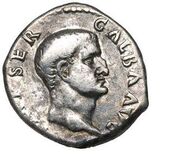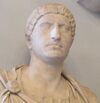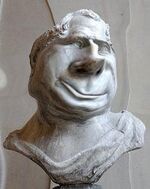Year of the Four Emperors
The Year of the Four Emperors was a period of civil war in the Roman Empire between June 68 and December 69 when no less than four people became Roman Emperor and enjoyed the fruits of such power for a period of several weeks or even months if they were lucky. It ended with the last of these emperors, Vespasian, who managed to get everyone across the empire to "settle down" and "chill" and began a new imperial dynasty.
Galba[edit]
Galba was a big-nosed man and the first, following the suicide of Nero, to seize power in Rome after his wife told him "I reckon that being emperor lark is pretty easy; in fact I think that even a big-nosed, penny-pinching twat like you could do it!". After having the senate proclaim him Emperor, Galba (like most big nosed people) fussed over the state of the Empire's finances. It was because of this that he completely failed to understand the importance of bribing the Praetorian Guard and the army, instead believing in a silly, pre-Caesar quality called "loyalty". Whilst he was spending all his time in the senate house arguing the toss about taxation and public expenditure, legions all over the Empire were throwing down his statues, taking a shit on them and proclaiming their own favourite emperors. Eventually, Galba was overthrown by an army lead by a mincing ponce called Otho.
Otho[edit]
Otho, as I've mentioned before, was a perfumed ponce who used to be good friends with Nero. Because we're talking about the ancient world and its weird morality, Otho was incredibly popular with the butch, blood-caked soldiers who'd helped him into power. However, the empire remained in a state of civil war and Otho's recognition by the senate was hardly enough to secure acceptance of his rule elsewhere. Indeed, the senate were actually somewhat opposed to Otho becoming emperor because of his old friendship with Nero, whom the senate thought was a dick; they only voted Otho his powers because they feared the swords of his soldiers. Vitellius, a thick-necked military commander who'd fancied being emperor for ages, hadn't even finished soiling all of Galba's statues before news reached him of Otho's succession. Angered by this he marched on Rome and was unsurprised to find Otho busy filing his nails. Although there was a pitched battle between Otho and Vitellius's forces, Otho couldn't really be bothered any more and killed himself in an unwise attempt to become "the new Nero". The senate, deciding that there probably wasn't anyone else left with designs on the purple, recognised Vitellius as emperor and assumed that was the end of it.
Vitellius[edit]
Was it bollocks. Vitellius had hardly settled down to the business of government when it was brought to his attention that the legions in the East had proclaimed Vespasian as emperor. Vitellius sighed, put his pen down, and prepared his legions for battle. When he heard that all the legions weren't available as they'd proclaimed loyalty to Vespasian he called the senate to a meeting and told them he'd decided he didn't want to be emperor any more and would someone else like a go? The senate passed a motion declaring "tough!" and within days Vitellius was arrested by Vespasian's troops, executed and his body was thrown in the Tiber. The senate recognised Vespasian as emperor and started taking bets on who would be next. A lot of senators lost a lot of money in the coming years.
Vespasian[edit]
As you'll no doubt be aware if you were paying attention at the start, Vespasian was the one who defied the fashion of the day and not only managed to hold the imperial office for more than a few weeks but succeeded in ruling for a decade and started his own dynasty. For a full, frank and fruity look at his reign see the entry on him.
| Preceded by: Nero |
Roman Emperor(s) 68-69 |
Succeeded by: Vespasian |
| ||||||||||||||||||||||||||



